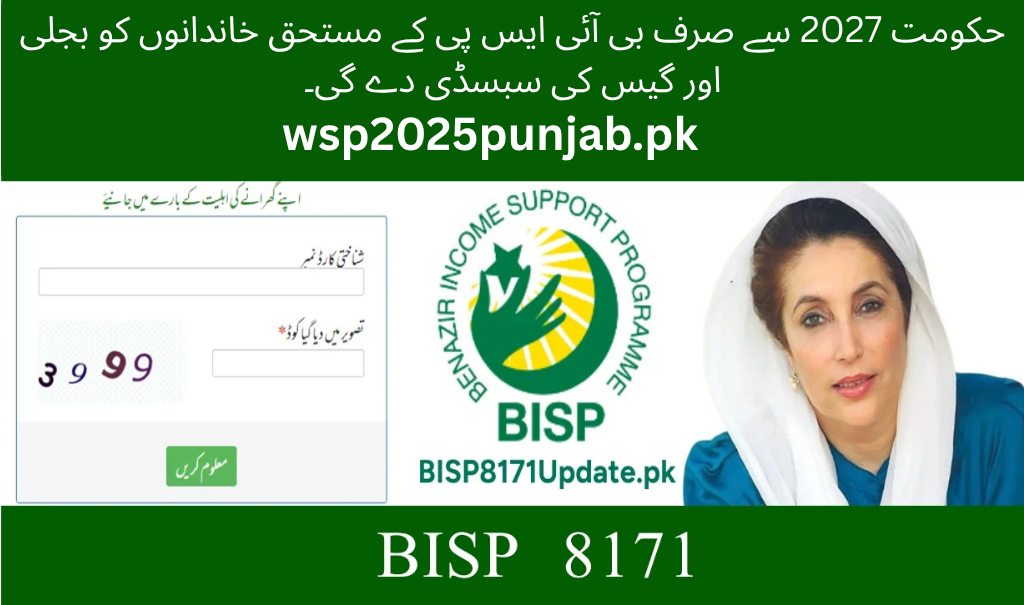Big Change in Subsidy System
The government of Pakistan is changing how it gives electricity and gas subsidies. From now on, not everyone will get help. Only poor and low-income families, registered with BISP (Benazir Income Support Programme), will receive support.
This change will start from January 2027. The goal is to help only those who truly need it.
Why Was the Old System Unfair?
Previously, everyone received the same subsidy—rich and poor alike. But that created lots of issues:
- Rich individuals consumed more electricity and received more money in return.
- Poor families did not receive sufficient assistance.
- Government lost billions of rupees.
- Power companies incurred huge losses.
To rectify this, the government has now made the decision to provide assistance only to BISP-verified families.
How Will the New System Work?
✅ 1. Utilizing the BISP NSER Database
The NSER (National Socio-Economic Registry) assists the government in identifying poor families. It contains information such as:
- Family income
- Number of members in the household
- Employment status
- Type of residence
✅ 2. Confirming Poor Families
By the year 2025, the government will confirm those families that are in need. Only the families registered in the BISP database will receive electricity and gas subsidies.
✅ 3. Phasing Out Blanket Subsidies
The existing system will be shut down. Only poor families, carefully selected, will receive assistance from January 2027.
✅ 4. Direct Support
Rather than providing discount rates to all, the government can provide cash or direct discounts to only confirmed poor families.
What About Subsidies on Gas?
Subsidies on gas will also be the same. There will be a complete plan on gas by mid-2026. Similar to electricity, only BISP families will receive assistance on the bill for gas as well.
Important Dates to Remember
| Date | Action |
|---|---|
| June 2025 | Final plan approval expected |
| Dec 2025 | Verification of poor families |
| Jan 2027 | New targeted subsidy starts |
| June 2026 | Gas subsidy plan announced |
| Late 2025 | Progress reports every 3 months |
How Will This Help Families?
If your household is registered with BISP and identified as low-income, you can receive:
- Direct cash assistance for electricity/gas bills
- Faster and more equitable support
- Less load-shedding because of lower power consumption
- A system favoring only the poor
Government to Promote Energy-Saving Appliances
To conserve more energy, the government will also bring in new regulations for household appliances such as:
- Fans
- Refrigerators
- Air conditioners
This is known as MEPS (Minimum Energy Performance Standards). From 2027, energy-saving appliances only.
Also:
Government offices need to purchase energy-saving appliances from 2025.
Progress will be reported every 3 months.
Why Is This Good for Pakistan?
MEPS and subsidies will:
- Reduce your bills for electricity
- Decrease power load on the grid
- End waste of energy
- Make the system more equitable for the poor
Supported by IMF & World Bank
Supported by World Bank & IMF
These large reforms are also backed by:
- IMF
- World Bank
They are assisting Pakistan with:
- Planning
- Technical assistance
- Tracking progress
- Establishing an equitable subsidy system
FAQs – Questions You May Have
Who will receive the new subsidy?
Only low-income families confirmed through BISP.
Will rich individuals still receive a discount?
No. Blanket subsidies will end in 2027.
Will gas be covered?
Yes. The same policy will be applied to gas by 2026.
What is MEPS?
It’s a policy to permit only energy-saving home appliances.
When will all this begin?
By January 2027, the whole system will be operational.
Final Words
The government’s new plan to give more subsidy through energy is a step in the right direction. It will benefit poor families more and prevent wealthy individuals from taking unfair advantages.
Through the BISP mechanism, help will reach those who deserve it. That means:
- Reduced expenses
- More equitable support
- Better economy
It’s a wise and equitable approach to assisting Pakistan’s most deserving families.
Read This:
👉 Biometric Success Rate in Different Districts – Full Comparison 2025
Disclaimer: This is for information purposes only. We are not associated with BISP or any government agency. To get official news, log on to the website of Official BISP.

